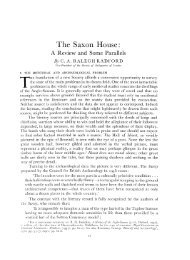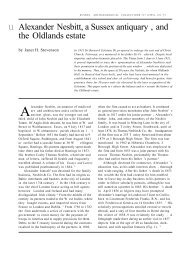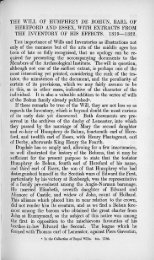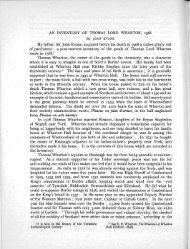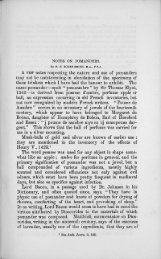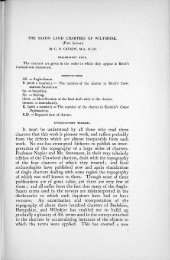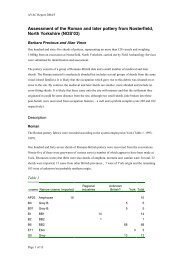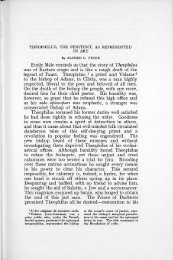ROMAN URBAN TOPOGRAPHY in Britain and the western Empire
ROMAN URBAN TOPOGRAPHY in Britain and the western Empire
ROMAN URBAN TOPOGRAPHY in Britain and the western Empire
You also want an ePaper? Increase the reach of your titles
YUMPU automatically turns print PDFs into web optimized ePapers that Google loves.
Civic Pride: a factor <strong>in</strong> Roman town plann<strong>in</strong>g S S Frere<br />
A variety of motives may lie beh<strong>in</strong>d <strong>the</strong> erection of public<br />
monuments, rang<strong>in</strong>g from piety to self-advertisement,<br />
from political propag<strong>and</strong>a to love of animals. These<br />
motives are often penetrated or revealed <strong>in</strong> literate periods<br />
by evidence such as wills or <strong>the</strong> <strong>in</strong>scriptions carved on <strong>the</strong><br />
monuments <strong>the</strong>mselves to make explicit <strong>the</strong> name of <strong>the</strong><br />
donor <strong>and</strong> his reasons for expenditure; but <strong>in</strong> <strong>the</strong> absence<br />
of such evidence, as at prehistoric monuments or <strong>in</strong><br />
Roman Brita<strong>in</strong>, <strong>the</strong>re is room for considerable divergence<br />
of <strong>in</strong>terpretation. We must also always remember that<br />
Civic Pride can be both corporate <strong>and</strong> <strong>in</strong>dividual.<br />
In study<strong>in</strong>g <strong>the</strong> ancient world it is provident to keep <strong>in</strong><br />
m<strong>in</strong>d <strong>the</strong> relatively small populations form<strong>in</strong>g <strong>the</strong> communities<br />
of that time, <strong>in</strong> which personal knowledge of <strong>the</strong><br />
majority of o<strong>the</strong>r citizens was-far more widespread than it<br />
is today, <strong>and</strong> personal reputation was correspond<strong>in</strong>gly<br />
more <strong>in</strong>timate <strong>and</strong> more vivid. We have to make <strong>the</strong><br />
imag<strong>in</strong>ative leap back to <strong>the</strong> ethos of a pre-<strong>in</strong>dustrial<br />
society, where <strong>the</strong> responsibilities of a l<strong>and</strong>lord for his<br />
tenant or of <strong>the</strong> rich for expenditure on public purposes<br />
were far more powerful social obligations than <strong>the</strong>y are<br />
today, <strong>and</strong> where <strong>the</strong> absence of journalists placed far<br />
greater emphasis on deeds than on words <strong>in</strong> <strong>the</strong> attraction<br />
of political support. In <strong>the</strong> modern world <strong>the</strong>se attitudes<br />
have been eroded by high taxation <strong>and</strong> by o<strong>the</strong>r forms of<br />
legislation based on <strong>the</strong> <strong>the</strong>ory that <strong>the</strong> state can provide<br />
more uniformly <strong>and</strong> more efficiently — a <strong>the</strong>ory whose<br />
validity <strong>in</strong> its turn is now beg<strong>in</strong>n<strong>in</strong>g to be <strong>in</strong> doubt.<br />
In <strong>the</strong> ancient world, of course, public expenditure by<br />
<strong>the</strong> rich was not always <strong>the</strong> product of voluntary benevolence,<br />
because for many centuries <strong>the</strong>re had existed <strong>the</strong><br />
system of ‘liturgies’ as <strong>the</strong>y were known <strong>in</strong> <strong>the</strong> Greek east,<br />
or munera <strong>in</strong> <strong>the</strong> Lat<strong>in</strong> west, a system not unlike <strong>in</strong> its<br />
effects <strong>the</strong> surtax of more recent times; by it certa<strong>in</strong> duties,<br />
often <strong>in</strong>volv<strong>in</strong>g expenditure, were regularly <strong>and</strong> compulsorily<br />
shouldered by <strong>the</strong> rich. On <strong>the</strong> whole <strong>the</strong>se duties<br />
were pr<strong>in</strong>cipally connected with transport <strong>and</strong> food<br />
supply, with public enterta<strong>in</strong>ment, or with membership<br />
of delegations, <strong>and</strong> are not <strong>the</strong>refore of prime concern to<br />
us here; nor are <strong>the</strong> compulsory contributions payable by<br />
successful c<strong>and</strong>idates for office.<br />
Two questions are more relevant: (1) what expenditure<br />
<strong>in</strong> addition to compulsory burdens was voluntarily undertaken<br />
by <strong>the</strong> rich; <strong>and</strong> (2) whe<strong>the</strong>r ‘civic pride’ can be<br />
<strong>in</strong>cluded among <strong>the</strong> motives for <strong>the</strong> spend<strong>in</strong>g. We have to<br />
remember that although altruism certa<strong>in</strong>ly existed, as it<br />
still exists today, <strong>the</strong>re were clearly o<strong>the</strong>r motives too,<br />
connected with self-advertisement <strong>and</strong> <strong>the</strong> search for<br />
popularity for political ends; altruism <strong>and</strong> private <strong>in</strong>terest<br />
cannot always be easily dist<strong>in</strong>guished. One can identify<br />
both streams of motive, for <strong>in</strong>stance, <strong>in</strong> <strong>the</strong> so-called<br />
Marble of Thorigny, an <strong>in</strong>scription from Vieux <strong>in</strong> Norm<strong>and</strong>y,<br />
<strong>the</strong> capital of <strong>the</strong> Viducasses (CIL, 13, 3162;<br />
Pflaum 1949). Here T Sennius Sollemnis <strong>in</strong> outl<strong>in</strong><strong>in</strong>g his<br />
early 3rd-century career tells us that he was <strong>the</strong> son of<br />
34<br />
Sollemn<strong>in</strong>us, had been four times elected IIvir, <strong>and</strong> had<br />
served all public offices <strong>in</strong>clud<strong>in</strong>g augur <strong>in</strong> his civitas as<br />
well as hav<strong>in</strong>g undertaken seven munera (or compulsory<br />
public expenditures) <strong>the</strong>re. He had been flamen perpetuus<br />
<strong>in</strong> his home civitas as well as priest of <strong>the</strong> Imperial Cult at<br />
Lyon, where he had given a very expensive gladiatorial<br />
show (ano<strong>the</strong>r compulsory duty). He goes on to say that he<br />
had completed <strong>the</strong> bath build<strong>in</strong>g begun by his fa<strong>the</strong>r <strong>and</strong><br />
had bequea<strong>the</strong>d capital for its future ma<strong>in</strong>tenance. The<br />
gift of <strong>the</strong> bath build<strong>in</strong>g was not a compulsory munus but<br />
an act of benevolence <strong>in</strong> keep<strong>in</strong>g with his social position.<br />
But <strong>in</strong> mak<strong>in</strong>g <strong>the</strong> gift he was no doubt also streng<strong>the</strong>n<strong>in</strong>g<br />
<strong>the</strong> political st<strong>and</strong><strong>in</strong>g which eventually brought him to <strong>the</strong><br />
highest position <strong>in</strong> Roman Gaul, <strong>the</strong> imperial priesthood<br />
<strong>and</strong> presidency of <strong>the</strong> Council of <strong>the</strong> three prov<strong>in</strong>ces.<br />
Public benefactions by an <strong>in</strong>dividual might take one of<br />
two forms. Many gave money for public festivals <strong>and</strong><br />
games, or for public banquets <strong>and</strong> distributions of cash,<br />
no doubt preferr<strong>in</strong>g or need<strong>in</strong>g <strong>the</strong> immediate popularity<br />
which this ephemeral expenditure secured <strong>the</strong>m. A good<br />
example is attested <strong>in</strong> a letter to <strong>the</strong> city of Ephesus from a<br />
proconsul of Asia, written <strong>in</strong> 104:<br />
Aquilius Proculus, vir clarissimus, to <strong>the</strong> magistrates,<br />
council <strong>and</strong> people of Ephesus, greet<strong>in</strong>g.<br />
Know<strong>in</strong>g Vibius Saturn<strong>in</strong>us to be an excellent<br />
citizen <strong>in</strong> all o<strong>the</strong>r respects, <strong>and</strong> know<strong>in</strong>g also that on<br />
many occasions previously he has provided many<br />
quite exceptional demonstrations of his munificence,<br />
I held him, as was right, among <strong>the</strong> most<br />
<strong>in</strong>timate of our friends; <strong>and</strong> now, s<strong>in</strong>ce he has<br />
undertaken to adorn <strong>the</strong> city magnificently with <strong>the</strong><br />
greatest <strong>and</strong> most notable benefactions . . . <strong>and</strong> has<br />
devoted 20,000 denarii for distributions <strong>and</strong> lotteries<br />
for <strong>the</strong> citizens, I consider that you too, <strong>in</strong><br />
consideration of <strong>the</strong> benefits which he has already<br />
bestowed upon you <strong>and</strong> those which he now promises,<br />
acted properly <strong>in</strong> repay<strong>in</strong>g his munificence <strong>and</strong><br />
good will by grant<strong>in</strong>g him <strong>the</strong> honours which you<br />
have decreed . . . (Abbott & Johnson 1926, no 71).<br />
But a sounder <strong>and</strong> more sceptical view is expressed <strong>in</strong> a<br />
letter from Anton<strong>in</strong>us Pius to <strong>the</strong> same city, written <strong>in</strong><br />
145:<br />
The emperor . . . Anton<strong>in</strong>us Pius . . . to <strong>the</strong> magistrates,<br />
council <strong>and</strong> people of Ephesus, greet<strong>in</strong>g. The<br />
munificence which Vedius Anton<strong>in</strong>us generously<br />
bestows upon you I have discovered, not so much<br />
from your letter as from his. For wish<strong>in</strong>g to secure<br />
assistance from me towards <strong>the</strong> embellishment of<br />
<strong>the</strong> public works which he has promised you, he<br />
made pla<strong>in</strong> how numerous <strong>and</strong> how splendid are <strong>the</strong><br />
build<strong>in</strong>gs which he is add<strong>in</strong>g to <strong>the</strong> city; yet you do<br />
not appreciate him as you should. For my part, I




